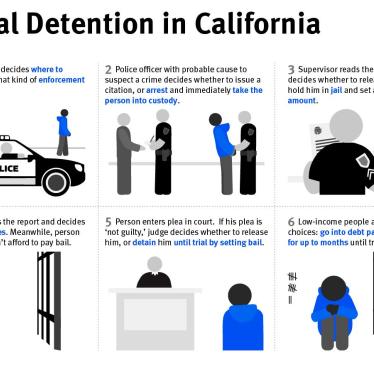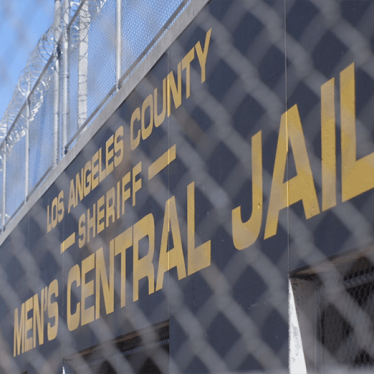Assembly Member Adrin Nazarian
State Capitol
P.O. Box 942849
Sacramento, CA 94249-0046
Assemblymember.nazarian@assembly.ca.gov
Dear Assembly Member Nazarian,
Human Rights Watch strongly opposes passage of The California Bail Reform Act, SB 10, and urges you to vote against it. Human Rights Watch, for years, has been a leading advocate nationally for reform of our bail and pretrial incarceration systems. We published a report in 2011 exposing the harms of the bail system in New York City.
The problem of pretrial detention in California and the call for reform
In “Not in it for Justice,” Human Rights Watch detailed how prosecutors and judges use unattainable bail as a method of “preventive detention,” by making it impossible for an individual to be released pretrial.
The only option besides staying in jail, for those unable to pay bail amounts, is to plead guilty for a sentence shorter than the time required to wait for trial. Our study of six representative California counties found that between 70 and 90 percent of misdemeanor and non-serious/non-violent felony defendants plead guilty and are released rather than wait until their first possible trial date.
The Court of Appeals in In re Humphrey
Unfortunately, SB 10, completely rewritten through a secretive process that excluded community representatives and advocacy/civil rights groups, contradicts the spirit of the Humphrey decision and betrays the goals of the bail reform movement.
SB 10 will massively increase preventive detention, not lower pretrial incarceration rates.
While the original version of SB 10 stated an intent to “safely reduce the number of people detained pretrial, while addressing racial and economic disparities in the pretrial system,”
The new SB 10 establishes extraordinarily broad categories of people excluded from release from custody pre-arraignment, including, among others, for low-level violations if the person has a pending case, no matter how minor, or if a person has been arrested for a restraining order violation, even if the arrest turned out to be wrongful or the restraining order invalid.
The bill then gives unfettered discretion for judges at arraignment to order preventive detention for a variety of reasons, including if the accused person has a pending case or is on probation, no matter how minor the previous and new charges are.
The detention hearing procedures proscribed in the bill violate due process and are so loose that they empower judges to preventively detain at will.
SB 10 will require biased, unfair risk assessment tools to determine release eligibility.
The incarceration decision is also influenced and, in some cases, determined by actuarial or profile-based risk assessments.
Further, the tools are not objective assessors of risk. The risk categories (high, medium and low) required in the proposed legislation, are policy choices, meaning that whoever controls the implementation of the tools can decide how large to make each category. This adjustability of scoring is significant given the proposed scheme in which anyone labelled “high risk” cannot be released pre-arraignment and will have a presumption of preventive detention.
Human Rights Watch has warned against any use of these profile-based risk assessment tools, as they are inherently biased, they deny an individualized hearing, they falsely purport to predict the future based on profiles, and they can easily be used to increase incarceration levels.
The new bill requires that “pretrial services” be responsible for running the risk assessments, gathering information about each accused person and making release/incarcerate and supervision recommendations.
The bill would make the probation department responsible for recommending release or detention and conditions of supervised release, while allocating supplemental funding for probation departments depending on how many people they supervise and what level of supervision. This arrangement may give probation departments incentive to recommend more supervision. Additionally, the bill gives supplemental funding to the courts and judiciary, while not saving costs of lowered levels of pretrial incarceration. The bill excludes community members from any oversight or even advisory role as to its implementation.
Human Rights Watch urges a “no” vote on SB 10.
We appreciate that many legislators have taken up the call to reform our unfair bail system, but Human Rights Watch objects to this counter-productive bill. We support ending money bail, but this bill will replace it with an equally, and likely more, harmful system that gives unchecked discretion to judges, relying on unfair risk assessments, to preventively detain people who have not been convicted of a crime and could be released safely back to their communities until their cases are resolved.
The new version of SB 10 is simply not bail reform. Please vote against it.
Jasmine Tyler
Advocacy Director, US Program
Human Rights Watch
John Raphling
Senior Researcher on Criminal Justice, US Program
Human Rights Watch
[1] https://www.hrw.org/report/2010/12/02/price-freedom/bail-and-pretrial-detention-low-income-nonfelony-defendants-new-york
[2] https://www.hrw.org/sites/default/files/report_pdf/usbail0417_web_0.pdf
[3]“Not in it for Justice,” p. 37-38.
[4] “Not in it for Justice,” p. 17-18; https://leginfo.legislature.ca.gov/faces/billTextClient.xhtml?bill_id=201720180SB10; Section 1(a) of SB 10, as amended September 6, 2017.
[5]“Not in it for Justice,” p. 56.
[6] “Not in it for Justice,” p. 51-62.
[7] https://caselaw.findlaw.com/ca-court-of-appeal/1886990.html
[8] Section 2 of SB 10, as amended September 6, 2017.
[9] Section 1 of the revised SB 10.
[10] Section 1320.10.
[11] Section 1320.11.
[12] Section 1320.18.
[13] Section 1320.18(a)(5).
[14] Sections 1320.19 and 1320.20.
[15] Sections 1320.9 and 1320.7.
[16] https://www.hrw.org/news/2018/06/01/q-profile-based-risk-assessment-us-pretrial-incarceration-release-decisions
[17] http://civilrightsdocs.info/pdf/criminal-justice/Pretrial-Risk-Assessment-Full.pdf
[18] Sections 1320.10 and 1320.20.
[19] Section 1320.24.
[20] https://www.hrw.org/news/2017/07/17/human-rights-watch-advises-against-using-profile-based-risk-assessment-bail-reform
[21] Section 1320.9.








